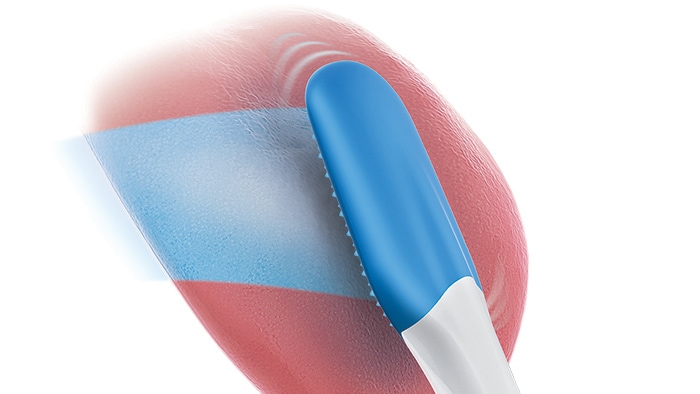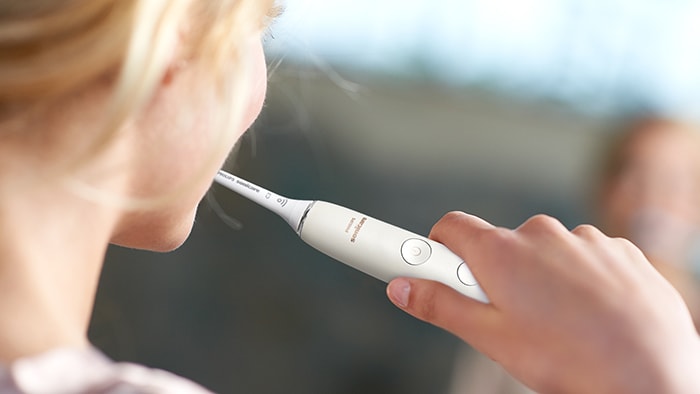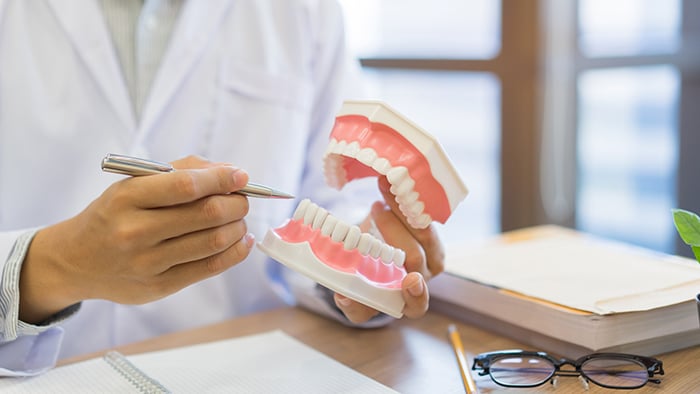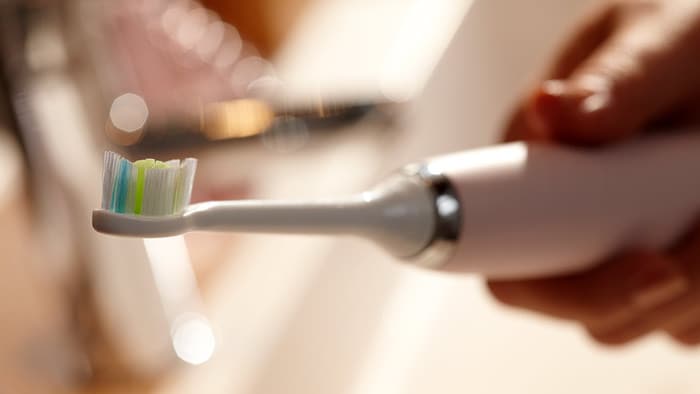Oral Hygiene Routine
Knowing is half the battle, and in the fight against tooth decay, bad breath, and poor oral hygiene, you need to know how to keep your teeth healthy and clean.
Morning Routine
1. Scrape The first thing you do in the morning should be to use a tongue scraper and remove any unpleasant bacteria. It’s very common to produce high levels of bacteria while asleep, since saliva levels are low and therefore we’re not subconsciously rinsing out our mouths with saliva. This problem is compounded if you tend to sleep with your mouth open, making your mouth even dryer. These bacteria are also why we can wake up with bad breath or morning breath. A tongue scraper or a specialised tongue brush is the right start to a clean and odour-free mouth for the day. Philips tongue care brush heads are designed to fit on a Sonicare toothbrush to give you a sonic powered tongue clean.
2. Brush Once you’ve scraped off the bacteria on your tongue, it’s time to brush your teeth. It may seem odd to brush your teeth before breakfast, since breakfast could be adding grime back onto your teeth, but it’s vital to your oral care. A lot of breakfast foods can contain acid that can soften your tooth enamel. The most popular examples are yoghurt, orange juice, and coffee. Brushing your teeth with softened enamel could harm the teeth, so always brush first and then eat your breakfast. Remember to brush all over the teeth and even onto the gums where the gums and teeth meet. Philips Sonicare ProtectiveClean is designed to give you a deep clean while being gentle enough for gums. It’s important to take care of gums and to keep gums healthy to prevent bacteria and even gum disease.

3. Rinse That’s right, rinse after eating breakfast. One of the lesser known dental care tips is that you don’t want to use mouthwash straight after brushing your teeth. Mouthwash can be acidic, just like some foods, so you don’t want to brush after using it. Mouthwash after breakfast is a great way to flush away any remaining bacteria and even food debris. Using mouthwash will also help you re-freshen your mouth and prepare you to face the world with great breath and a clean smile.

Throughout The Day
4. Hydrate An often-overlooked step in oral hygiene is drinking water. Drinking water is good for your overall health of course, but it can be vital to your oral health too. Water functions a lot like saliva when it comes to keeping your mouth clean. They both help you rinse your mouth and keep bacteria from settling on your teeth and gums. Drinking water is a simple and easy step to incorporate into your daily life when you’re considering how to keep your teeth healthy. 5. Eat right Lunchtime or even morning or afternoon tea rolls around and we take a break to enjoy a meal or a light snack. Eating is a normal part of the day, but keep in mind how your food is affecting your teeth. Heavy-coloured foods and foods with artificial colouring along with drinks like tea, coffee, and red wine can all stain your teeth. And sugary snacks can affect the strength of your teeth and even create tooth decay. Try eating things like apples, raw celery, raw carrot, raw broccoli, green beans are all great foods to help you keep your teeth bright and white and help to promote blood flow to keep hums healthy too. If you enjoy dairy, you can swap out the soft cheese for hard cheese—that way you’re still getting that important calcium, but you’re also getting the hard cheese-specific proteins that help to prevent the loss of important minerals in the mouth. Snacking on seeds and nuts can help as well—their abrasive texture helps remove surface stains while you snack. Even strawberries can help, thanks to their malic acid that can stimulate your saliva glands and help your oral system stay healthy.
What you need

-
- Play Pause
Philips Sonicare Philips Sonicare Prestige 9900 Rechargeable Toothbrush
HX9992/21
Personalized care for your oral health
Experience our most advanced electric toothbrush: Philips Sonicare Prestige 9900 with SenseIQ technology. It enhances our proven sonic technology with intelligence, sensing and adapting to deliver personalised oral care.
See all benefitsAvailable in:
Unfortunately this product is no longer available
6. Hydrate Once again, after eating or drinking, rinse it all down with water. Having a drink of water is especially important after eating and drinking. It can help loosen any food particulates that are stuck in the teeth (which can be common with nuts and seeds). A big glass of water can also help rinse of surface stains thanks to coffee, tea, and dark wine before the stains have a chance to take root. Drinking water is always important in any oral care routine.
Evening Routine
7. Floss At the end of the day, before bed, you should always floss. If you don’t floss, you’re only cleaning 60% of your teeth, with a whopping 40% being totally overlooked. That 40% is the surface that’s between your teeth. Your toothbrush can’t reach those surfaces, so flossing is the only way to clean your whole mouth. Flossing improves your gum health as well and even your breath, so it should be an essential part of everyone’s oral care routine in the evening. If you’re wondering how to keep gums healthy, analyse your flossing habits and see if you’re thorough enough. Try an electric flosser like Philips Sonicare Power Flosser for an effective gentle floss without the string. It’s important to floss before brushing in the evening. Flossing removes a lot of plaque between your teeth. That way when you introduce the healthy fluoride in your toothpaste, it can protect the sides of your teeth as well as the front and back.
8. Brush Finally, brush your teeth again. The last step in your oral hygiene routine is a thorough brushing of your whole mouth. Remember that a lot of bacteria likes to pop up while you sleep? ? It all spreads out from any bacteria that’s in your mouth when you go to sleep. Proper brushing before sleep means there’s less bacteria to spread overnight (and less chance of bad breath in the morning). Brush your teeth for at least two minutes each time you brush. Many electric toothbrushes will have built-in timers to help keep your teeth clean. Finally, don’t rinse! A lot of us rinse out the remaining toothpaste once we finish brushing our teeth, but it’s better if we leave it on our teeth overnight. Leaving residual toothpaste on the teeth extends the toothpaste’s antibacterial effect into the night.














